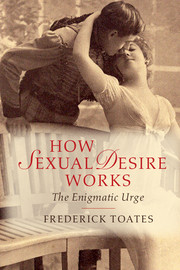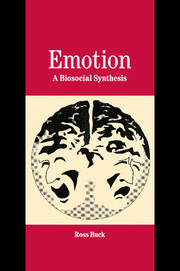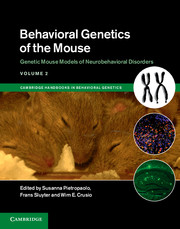Refine listing
Actions for selected content:
1174 results in Ebooks in neuroscience
Index
-
- Book:
- Emotion
- Published online:
- 05 October 2014
- Print publication:
- 09 October 2014, pp 423-448
-
- Chapter
- Export citation
Tables
-
- Book:
- Emotion
- Published online:
- 05 October 2014
- Print publication:
- 09 October 2014, pp xiv-xiv
-
- Chapter
- Export citation
Chapter 4 - Attachment: the evolution, development, and neurochemistry of sociality
- from Part II - Biological emotions: a readout view
-
- Book:
- Emotion
- Published online:
- 05 October 2014
- Print publication:
- 09 October 2014, pp 145-202
-
- Chapter
- Export citation
Chapter 5 - Cognitive and linguistic emotions
- from Part III - Higher-level emotions: an ecological-systems view
-
- Book:
- Emotion
- Published online:
- 05 October 2014
- Print publication:
- 09 October 2014, pp 205-245
-
- Chapter
- Export citation

How Sexual Desire Works
- The Enigmatic Urge
-
- Published online:
- 05 October 2014
- Print publication:
- 18 September 2014

Emotion
- A Biosocial Synthesis
-
- Published online:
- 05 October 2014
- Print publication:
- 09 October 2014

Behavioral Genetics of the Mouse
-
- Published online:
- 05 October 2014
- Print publication:
- 25 September 2014
Series page
-
- Book:
- Behavioral Genetics of the Mouse
- Published online:
- 05 October 2014
- Print publication:
- 25 September 2014, pp ii-ii
-
- Chapter
- Export citation
Contents
-
- Book:
- Behavioral Genetics of the Mouse
- Published online:
- 05 October 2014
- Print publication:
- 25 September 2014, pp vii-viii
-
- Chapter
- Export citation
Section 7 - Neurodegenerative disorders
-
- Book:
- Behavioral Genetics of the Mouse
- Published online:
- 05 October 2014
- Print publication:
- 25 September 2014, pp 391-446
-
- Chapter
- Export citation
16 - Obsessive–compulsive disorder and Gilles de la Tourette syndrome
- from Section 4 - Social dysfunction and mental retardation
-
-
- Book:
- Behavioral Genetics of the Mouse
- Published online:
- 05 October 2014
- Print publication:
- 25 September 2014, pp 173-188
-
- Chapter
- Export citation
32 - Huntington’s disease
- from Section 7 - Neurodegenerative disorders
-
-
- Book:
- Behavioral Genetics of the Mouse
- Published online:
- 05 October 2014
- Print publication:
- 25 September 2014, pp 436-446
-
- Chapter
- Export citation
Contributors
-
-
- Book:
- Behavioral Genetics of the Mouse
- Published online:
- 05 October 2014
- Print publication:
- 25 September 2014, pp ix-xii
-
- Chapter
- Export citation
9 - Epilepsy
- from Section 3 - Autonomous and motor disorders
-
-
- Book:
- Behavioral Genetics of the Mouse
- Published online:
- 05 October 2014
- Print publication:
- 25 September 2014, pp 79-85
-
- Chapter
- Export citation
24 - Alcohol-use disorders
- from Section 6 - Substance dependence and abuse
-
-
- Book:
- Behavioral Genetics of the Mouse
- Published online:
- 05 October 2014
- Print publication:
- 25 September 2014, pp 293-302
-
- Chapter
- Export citation
27 - Drug abuse
- from Section 6 - Substance dependence and abuse
-
-
- Book:
- Behavioral Genetics of the Mouse
- Published online:
- 05 October 2014
- Print publication:
- 25 September 2014, pp 330-349
-
- Chapter
- Export citation
Section 4 - Social dysfunction and mental retardation
-
- Book:
- Behavioral Genetics of the Mouse
- Published online:
- 05 October 2014
- Print publication:
- 25 September 2014, pp 86-239
-
- Chapter
- Export citation
29 - Opioids-related disorders
- from Section 6 - Substance dependence and abuse
-
-
- Book:
- Behavioral Genetics of the Mouse
- Published online:
- 05 October 2014
- Print publication:
- 25 September 2014, pp 379-390
-
- Chapter
- Export citation
26 - Cannabis abuse and dependence
- from Section 6 - Substance dependence and abuse
-
-
- Book:
- Behavioral Genetics of the Mouse
- Published online:
- 05 October 2014
- Print publication:
- 25 September 2014, pp 315-329
-
- Chapter
- Export citation
19 - Prader–Willi and Angelman syndromes
- from Section 4 - Social dysfunction and mental retardation
-
-
- Book:
- Behavioral Genetics of the Mouse
- Published online:
- 05 October 2014
- Print publication:
- 25 September 2014, pp 220-231
-
- Chapter
- Export citation
